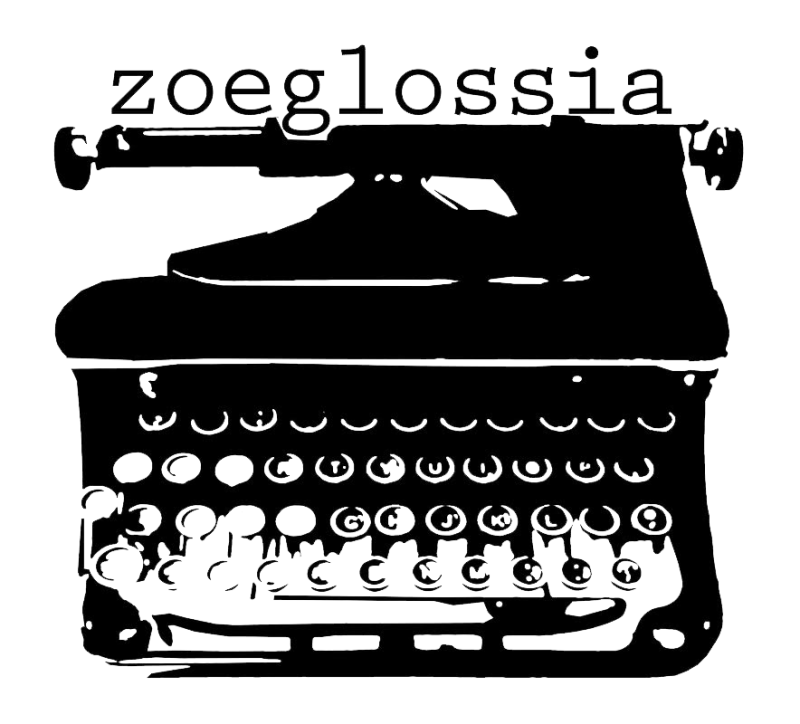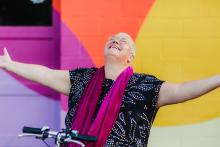National Poetry Month Spotlight: Zoeglossia

This article originally appeared on the Art Works blog on April 28, 2023, under the title Grant Spotlight: Zoeglossia.
The literary organization Zoeglossia’s name is the combination of two Greek words – zoe, which means life, and glossia, which means language. It’s an appropriate composite for the nonprofit, which was created to provide professional and creative support for disabled poets, who are often excluded from opportunities due to lack of accessibility.
“I just end up feeling that disability poetics, which comes out of an experience of a body or mind that moves differently through the world, is a really important poetics of liberation,” said Zoeglossia co-founder Sheila Black.
Black founded Zoeglossia with fellow poets Jennifer Bartlett and Connie Voisine after having a conversation with visually-impaired poet Kathi Wolfe, who suggested disabled poets could benefit from a community like CantoMundo, Cave Canem, and Kundiman, organizations that serve poets of specific racial or ethnic backgrounds.
“It really came out of friends having conversations and kind of manifesting what we talked about,” Black said. “It was miraculous really.”
The organization held their first retreat in 2019, bringing together a group of fellows with more established disabled poets for mentorship, panels, readings, and a keynote lecture. Now, Zoeglossia has four classes of Fellows, with the most recent class announced earlier this year. Fellows have a five-year term during which they can attend the annual retreat three times, allowing them to meet with and learn from different teachers and fellows.
In 2022, Zoeglossia received a $10,000 grant from the National Endowment for the Arts to support its annual retreat.
Poet Saleem Hue Penny, who serves as Zoeglossia’s programs and partnership director, joined the organization as a Poetry Coalition Fellow in 2021. The Poetry Coalition is network of more than 25 different poetry organizations, which includes Zoeglossia as well as the groups like Cave Canem that initially inspired Black and her co-founders.
Although Saleem joined Zoeglossia in 2021, he had previously been asked to write a poem for the organization’s Poem of the Week, a series of poems curated by different disabled poets. Penny recalls that in writing his redacted poem for that series, it was the first time a publisher had ever asked him to consider how they might make the work screen-reader accessible.
“Right there, that was a cue to me that this could be a very different type of community,” he said.
In his current role, Penny prioritizes cultivating community by listening to and responding to the needs of the Fellows, such as through the creation of Sunday Salons where Fellows can access professional development opportunities, generate new work, and strengthen social connections.
“When we started this, the range of disabilities we had in our community was very wide, and none of us were experts in every way to make something accessible,” Black added. “It was new ground, and I know there’s a lot of times we’ve gotten things wrong. I think that it has made the community stronger, and we’ve tried to be a space where people could call us out on that and we could respond.”
Part of that response in recent years has been maintaining virtual elements to the annual retreat to expand accessibility – including a call-in option for a Fellow who lives in a rural area and can’t access high-speed broadband.
“That mindfulness and that care is something that is central to disability justice,” Penny said. “I think it’s easy to talk about these things very academically and very intellectually, but really recognizing that this is rooted in these concepts such as crip time – that you don’t move faster than the slowest in the group.”
Penny and Black both point out that efforts toward greater accessibility benefit all participants and enrich the experience for the entire community. Penny brought up the example of curb cuts in sidewalks – many able-bodied parents and caregivers are grateful to have these to navigate strollers while out walking, but they were originally created at the insistence of disability advocates whose wheelchairs couldn’t move from the sidewalk to road.
“Sometimes just the physical presence of a disabled person is the biggest monkey wrench stuck into the gears of our society,” Penny said. “And that’s not to say that we want to be that by any means. We just want to wake up and not be in pain and see some people that we love and do some work that’s valuable and rest and do it again. We need spaces like [Zoeglossia], because if in every interaction we’re the teacher or we’re the one who’s the case study, that’s no way to live.”
Penny and Black are excited for the future of that space, particularly as the first class of Fellows wraps up their five-year tenure next year. They are also hopeful that the Poem of the Week project can ultimately serve as an archive and resource of disability poetics and different ways of being.
“The get ahead at all costs [mentality] is very fundamentally challenged by disability,” Black said. “People are often threatened by disability in really profound ways and hostile to it in really profound ways, and I’m hoping that some of these paradigms of different kind of community are helping people see around that.”





